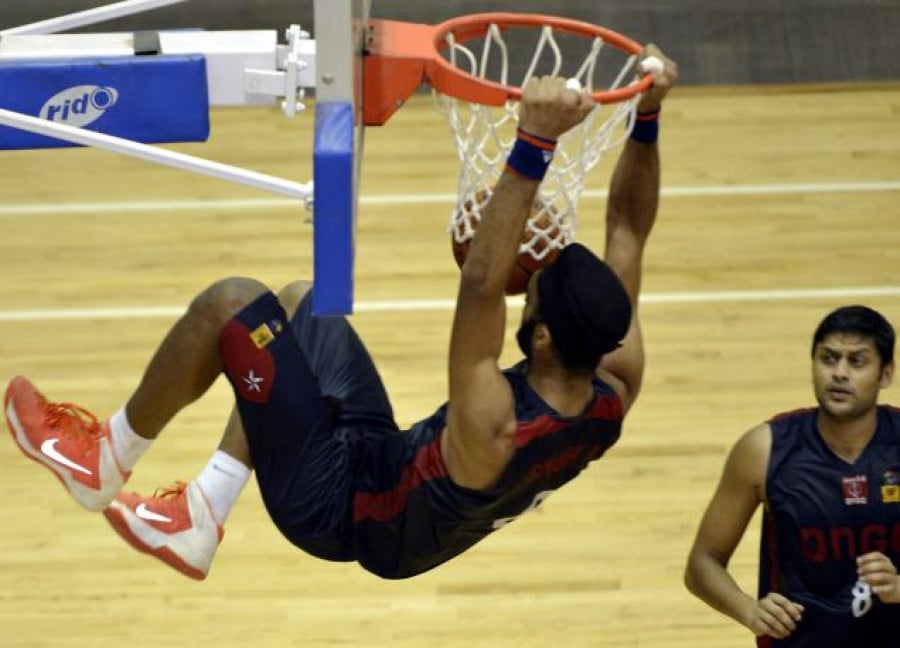Sikh basketball players required to remove turbans in controversial decision

No turbans allowed in the Asia Cup following FIBA rules
On July 12th, during the 5th FIBA Asia Cup in China, two Indian Sikh players, Amritpal Singh and Amjyot Singh, were required to remove their turbans before the game against Japan, in order to participate.9 The players were not allowed to play with their turbans on due to Rule 4.4.2 in the FIBA Rules, which states: “Players shall not wear equipment (objects) that may cause injury to other players. The following are not permitted: … Headgear, hair accessories and jewellery.”10 The Indian players were not permitted to wear their turbans for the duration the Asia Cup tournament.11Only after the players removed their turbans were they allowed to play in the first quarter. Amritpal and Amyjot Singh were shocked at this requirement as they play with their turbans on during practice and have done so for other international tournaments in the past, such as the Asian Championship in Manila and the Lusofonia Games in Goa.12
India’s American coach, Scott Flemming, explained that he met with the tournament officials the day before the game with Japan to discuss turbans during games. It appears that at the meeting, the officials had cleared the players to play with turbans on during the game. The coach is unsure what changed by the start of the game, arguing it to be a matter of infringing on the players' religious practices.13
The Times of India brought this incident, now two weeks old, to BFI president’s, RS Gill’s, attention, who was unaware of this development. Gill is also a Sikh player and will be requesting reports on this matter for further information, claiming that the players should be permitted to wear their turbans during play.14
The Indian sports minister, Sarbananda Sonowal, explained that the Indian Sports Ministry, formally known as Ministry of Youth Affairs and Sports, has spoken to the BFI for its reports.15 The Indian Sports Ministry has also requested the IOC to create a regulation on permitted headgear for international sports federations to follow, in the hopes that a ban on turbans will be not be an issue in future international sports tournaments.16
In response, FIBA explained that the headgear rule was created 10 years ago for the “safety on the basketball court and uniformity of equipment within a team”.17 Thus, a turban, like any other unauthorized headgear, is not permitted under FIBA rules.
It should be noted that international football faced a similar conflict as FIFA18 Laws had banned head covers till 2012 because it posed a safety threat to the players. After a two year review requested by the Asian Football Confederation (AFC)19, FIFA reversed its decision, amending the regulation to allow athletes to wear both hijabs and turbans as of March 2014.20 The section titled, “Other Equipment”, under Law 4, “The Players’ Equipment” in the FIFA regulations now states: “Modern protective equipment such as headgear...are not considered dangerous and are therefore permitted.”21
Though it is too early to determine FIBA’s decision on the Asia Cup turban ban, FIBA’s policy-making board will review the headgear matter at its August 27 meeting in Sevilla, and then decide how to proceed.22
To continue reading or watching login or register here
Already a member? Sign in
Get access to all of the expert analysis and commentary at LawInSport including articles, webinars, conference videos and podcast transcripts. Find out more here.
- Tags: Asian Cup | Basketball | Boxing | Boxing India | Commonwealth Games | Cricket | Governance | ICC Code of Conduct | ICC Code of Conduct for Players and Player Support Personnel | India | Indian Olympic Association (IOA) | International Boxing Association (AIBA) | International Cricket Council (ICC) | Regulation
Related Articles
- IOA drops late bid plans for New Delhi to host 2019 Asian Games
- AIBA limits Boxing India’s coaches at Games while athlete ruled ineligible due to hyperandrogenism
- Match-fixing update: 1400+ arrests in Interpol-coordinated World Cup 2014 Asian operation and Commonwealth to review sports integrity
- Top Tips For Indian Athletes Working With Sports Agents
Written by
Manali Kulkarni
Manali previously researched on sports and society in India, specifically focusing on the influence of sport on the gender divide in India. She joined LawInSport in September 2013 as a research assistant providing updates on Indian sports law.

 Global Summit 2024
Global Summit 2024